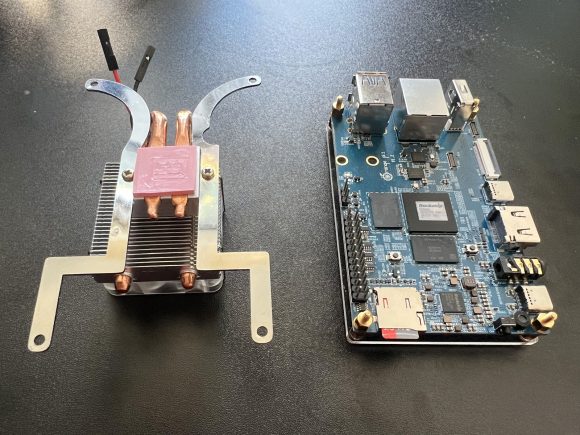22
Oct
2023
If you are considering using an Orange Pi 5 for Mining VerusCoin (VRSC) (Ad) one thing you should have for sure is an additional cooling solution like the GeeekPi Orange Pi 5/5B Cooling Fan with Heatsink, however although good and working well this solution is far from optimal and can benefit from some additional tweaking. The main thing that you can improve is the heat transfer efficiency since the default thermal transfer material that sits in between the CPU and the cooler is a pretty thick thermal pad. Thicker thermal pads are not that efficient, however with a big gap you cannot replace a pad with just thermal paste so you need another solution here…

What you need is a solid copper thermal pad to replace the pink thermal interface that the cooler kit comes with. There are a lot of different copper pads available both in terms of size and in terms of thickness. The ideal width and height would be 18 by 18 millimetres, though there are harder to find and you can go with 15 mm or 20 mm just fine as you can see on the photo above, we went for the bigger one as it covers a larger area. The more important thing here is the thickness and what worked out very well for us is a 1.2 mm thick copper pad (Ad), though you could probably use 1 mm or 1.5 mm as well and compensate with more or less thermal compound. Good thermal compound that we like to use is ARCTIC MX-4 Thermal Compound (8 g) (Ad), though you can use anything else that has good capabilities and you may have lying around already.

The average temperature with the active cooler installed with the default flexible thermal interface pad we have observed was around 65-67 degrees Celsius while mining VerusCoin (VRSC) or around 40 without 100% load. Without the active cooler installed the temperature quickly hits 85 degrees Celsius when the miner is started, so the cooler is doing quite a good job in reducing that operating temperature, however it is still higher than we would like to be for a device running 24/7 mining crypto currencies.

As for the hashrate, a little below 6.6 MH/s average hashrate with a power consumption of about 9 Watts measured at the wall. This is again the result with the active cooler installed with the default flexible thermal interface pad, but as we’ve mentioned things can be improved by replacing the flexible thermal interface pad with a solid copper pad and good thermal compound… the question is how much of an improvement will that bring.

In terms of operating temperature, quite a significant improvement when we add the 20×20 mm copper pad with thickness of 1.2 mm and MX4 thermal compound in between… there is more than 20 degrees Celsius drop in the operating temperature. The newly measured stable operating temperature of the CPU of the Orange Pi 5 with the copper pad is now around 43.5 degrees Celsius, just a little bit higher than the Pi 5 with no active cooling and no load. You can hardly get any lower than that probably with conventional air cooling and you probably would not want to do it anyway as that operating temperature is really what we are more than fine with while mining.

After replacing the flexible thermal pad with a copper pad, we are seeing a slight increase in the average hashrate produced of a little over 100 KH/s to about 6.7 MH/s which might not be that much but is still somewhat of an improvement. There is also a slight drop of the power usage, we’ve measured 8.8 Watts at the wall down from 9 Watts before, so 0.2 Watts decrease in power usage. Again, might not be much but is still something that if you put in a large-scale perspective might build up to more significant numbers over time. The main goal was to lower the operating temperature while mining, but it has led to some other slight improvements as well, so a good job doing this little bit of modification to improve things overall. So, if you have an Orange Pi 5 or a few and if you are using them for mining VRSC or for other things that actually do require more processing power you might consider doing this modification for the cooling as well.
– For a guide on setting up and using Orange Pi 5 for mining verusCoin (VRSC)…
- Publihsed in: Tests and Reviews
- Related tags: ARM VerusCoin miner, ARM VerusCoin mining, ARM VRSC miner, ARM VRSC mining, mining VerusCoin, mining VRSC, Orange Pi 5, Orange Pi 5 crypto mining, Orange Pi 5 miner, Orange Pi 5 mining, Orange Pi 5 Verus, Orange Pi 5 Verus miner, Orange Pi 5 Verus mining, Orange Pi 5 VerusCoin, Orange Pi 5 VerusCoin miner, Orange Pi 5 VerusCoin mining, Orange Pi 5 VRSC, Orange Pi 5 VRSC miner, Orange Pi 5 VRSC mining, Rockchip RK3588S, Rockchip RK3588S for crypto mining, Rockchip RK3588S miner, Rockchip RK3588S mining, Rockchip RK3588S mining performance, Rockchip RK3588S Verus mining, Rockchip RK3588S VerusCoin hashrate, Rockchip RK3588S VerusCoin mining, Rockchip RK3588S VRSC hashratem, Rockchip RK3588S VRSC mining, VerusCoin, VerusCoin ARM ccminer, VerusCoin Lunux ARM miner, VRSC, VRSC ARM ccminer, VRSC Lunux ARM miner
Check Some More Similar Crypto Related Publications:




